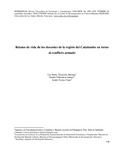| dc.rights.license | http://creativecommons.org/licenses/by-nc-sa/3.0/ve/ | es_VE |
| dc.contributor.author | Tarazona Arteaga, Luz Belsy | |
| dc.contributor.author | Villamizar Jaimes, Daniel | |
| dc.contributor.author | Torres Claro, Jaider | |
| dc.date.accessioned | 2021-01-25T17:32:04Z | |
| dc.date.available | 2021-01-25T17:32:04Z | |
| dc.date.issued | 2021-01-25 | |
| dc.identifier.issn | ISSN 07983069 | |
| dc.identifier.uri | http://www.saber.ula.ve/handle/123456789/47262 | |
| dc.description.abstract | La investigación denominada “Experiencias de vida del docentedel Catatumbo en torno al conflicto
armado y su práctica pedagógica”, inspiradas en los relatos de vida de diez docentes participantes
de la Institución Educativa Colegio Integrado Campo Dos del municipio de Tibú, quienes han
permanecido por más de 15 años ejerciendo practicas pedagógicas en la región del Catatumbo, “Casa
del trueno” en lengua Barí,se encuentra ubicada en límites con la República Bolivariana de Venezuela
y al norte del departamento Norte de Santander (Colombia). El presente artículo busca visibilizar la
vulneración de derechos fundamentales de los docentes que ejercen sus prácticas pedagógicas, de las
que se ha escuchado muy poco en nuestro país. La ausencia de la institucionalidad y la falta de
políticas públicas, hacen que estos municipios son afectados por la presencia de grupos armados
organizados, bandas criminales, disidenciasde de las FARC - EPL,y delincuencia común.
La investigación buscó comprender la incidencia que tiene el conflicto armado en sus prácticas
pedagógicas de los docentes del colegio Integrado Campo Dos, el cual se encuentra expuesto a las
diferentes expresiones del conflicto armado.
La investigación se desarrolló desde una perspectiva cualitativa, enmarcada en relatos, entrevistas
semiestructurada y la sistematización de las experiencias vividas, y se ordenaron en tres categorías
deductivas: actitudes docentes, experiencias vividas, e incidencia en la práctica pedagógica.
Es una constante, las múltiples violaciones de derechos fundamentales de los docentes que ejercen su
práctica pedagógica, que en consecuencia, han optado por mantener un silencio como una estrategia
para poder salvarguardar su integridad física y la de sus familiares pues han perdido la confianza
en las pocas instituciones que hacen presencia en este territorio. | es_VE |
| dc.language | Spanish | |
| dc.language.iso | es | es_VE |
| dc.publisher | SaberULA | es_VE |
| dc.rights | info:eu-repo/semantics/openAccess | es_VE |
| dc.subject | Lengua Barí | es_VE |
| dc.subject | Vulneración | es_VE |
| dc.subject | Categorías deductivas | es_VE |
| dc.subject | Conflicto armado | es_VE |
| dc.subject | Entrevista semiestructurada | es_VE |
| dc.title | Relatos de vida de los docentes de la región del Catatumbo en torno al conflicto armado | es_VE |
| dc.title.alternative | Life stories of teachers in the Catatumbo region around the armed conflict | es_VE |
| dc.type | info:eu-repo/semantics/article | es_VE |
| dc.description.abstract1 | The investigation called "Life experiences of the teacher of Catatumbo around the armed conflict and
its pedagogical practice". Inspired by the life stories of ten participating teachers of the
Educational Institution Colegio Integrado Campo Dos of the municipality of Tibú, who have remained
for more than 15 years practicing pedagogical practices in the Catatumbo region, “Casa del thunder”
in the Barí language, It is located on the border with the Bolivarian Republic of Venezuela and
north of the Norte de Santander department (Colombia). This article seeks to make visible the
violation of fundamental rights of teachers who exercise their pedagogical practices, of which very
little has been heard in our country. The absence of institutions and the lack of public policies
mean that these municipalities are affected by the presence of organized armed groups, criminal
gangs, dissidents from the FARC - EPL, and common crime. The research sought to understand the
impact that the armed conflict has on the pedagogical practices of the teachers of the Integrated
School Campo Dos, which is exposed to the different expressions of the armed conflict. The research
was developed from a qualitative perspective, framed in stories, semi-structured interviews and the
systematization of lived experiences, and they were arranged in three deductive categories: teaching
attitudes, lived experiences, and incidence in pedagogical practice. It is a constant, the multiple
violations of fundamental rights of teachers who exercise their pedagogical practice, which
consequently, have chosen to maintain silence as a strategy to save their physical integrity and
that of their families because they have lost trust in the few institutions that are present in this
territory. | es_VE |
| dc.description.colacion | 732-751 | es_VE |
| dc.description.email | luzbelsyt@gmail.com | es_VE |
| dc.description.frecuencia | Cuatrimestral | |
| dc.description.paginaweb | www.saber.ula.ve/fermentum | |
| dc.identifier.depositolegal | pp1991102ME302 | |
| dc.publisher.pais | Venezuela | es_VE |
| dc.subject.institucion | Universidad de Los Andes | es_VE |
| dc.subject.keywords | Barí Language | es_VE |
| dc.subject.keywords | Violation | es_VE |
| dc.subject.keywords | Deductive Category | es_VE |
| dc.subject.keywords | Armed conflict | es_VE |
| dc.subject.keywords | Semi-structured interview | es_VE |
| dc.subject.seccion | Fermentum: Artículos | es_VE |
| dc.subject.tipo | Artículos | es_VE |
| dc.type.media | Texto | es_VE |


